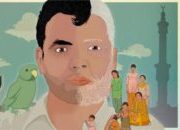
In 2012 when his father passed newbie filmmaker Arshad Khan was working on putting together his first fiction feature, but having gone through a wealth of archival home videos in preparing for the memorial service, Khan slowly came to realize that he wanted, and needed instead to tell his own story of growing up gay with his devout Moslem father. It’s a complex tale that was painful at times for both son and father, but by the time the final credits roll on the documentary you appreciate what a cathartic exercise it must have been for Khan finally being able to share his intriguing story.
30 something-year-old Khan was born in Pakistan into a wealthy middle-class family. His Army Engineer father always loved to indulge in the latest technical gadgetry, and they were one of the very few families to actual own a video camera in the 1980’s. His father left the Army, made a fortune, and then lost it and with the family now living in much reduced circumstances, they decided to try for a fresh new start and emigrate to Canada. Khan a teenager by now had been constantly bullied at school for being effeminate, and so never having made any friends, thought that beginning again in a more liberal culture where he was totally unknown, would suit him perfectly.
Sadly he was very wrong and the high school he was sent too in the snowy suburban town outside Toronto where he stuck out like a sore thumb, the other pupils mercilessly picked on him for being a ‘faggot’ and being Pakistani. For an easier life, he even tried dating girls, but he failed miserably having realized by now that he really only like boys.
Khan explains being gay in his culture means that there are more repercussions than usual as his mother had a great deal of disrespect for him due to the fact that she feels a enormous burden of shame for her and the family if ever decided to come out publicly.
For Khan though liberation came in the form of University when he not only discovered an actual LGBT community. but he found his voice and calling as an activist. The trouble is that it all coincided with his father’s decision to become more deeply religious, and after 9/11 with so much global resentment now fostered at Moslems everywhere, Khan Sr. became ultra-conservative and insisted the entire family revert back to traditional Pakistani rituals.
He had long held back secrets from his father even as a very young child when he was habitually sexually abused by other male family members, so now not being able to share his new life was not a great different. Khan Snr. once equated homosexuality to being akin to being a drug addict or a murdered which didn’t exactly set the stage for a reasoned discussion. So Khan uses this documentary to enable him for once in his life to be completely open and be himself in a way that he never could do when his father was alive. Their relationship may have not been as fulfilling as Khan would have hoped and wished for, but seeing his wealth of remarkable home videos, you can see the genuine love that his father has for him, and equally important, the unmistakable sense of pride.
Khan’s story, beautifully told, is very intimate and personal and is so easy to relate too, and you know that it will also so help others in similar circumstances as they start coming-out journeys of their own.

